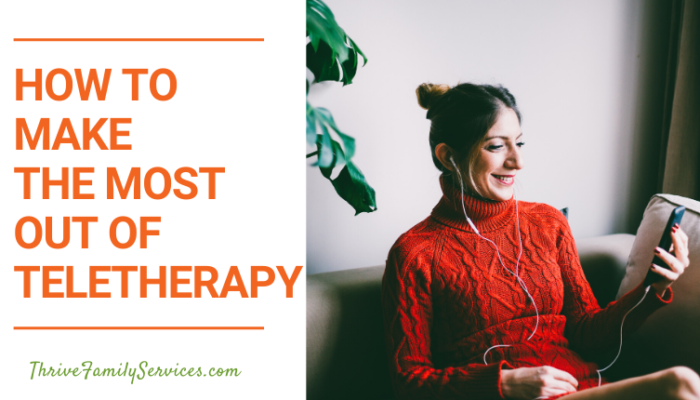As advances in technology improve, the idea of “teletherapy” – or therapy through a screen – has been an increased resource for therapists to meet with clients in a way that can minimize safety risks associated with getting to the therapy office.
Teletherapy can be offered for a variety of reasons. In short, if you or your therapist is unable to get to the office, teletherapy can be a great tool to take advantage of! Sometimes, teletherapy is needed because of weather-related obstacles that result in unsafe driving conditions. Other times, teletherapy is needed due to health-related issues, like not wanting to spread a contagious illness, recovering from surgery, or having a child sick at home. Furthermore, sometimes other obstacles pop up – like doing couples counseling with a partner that lives in another city, losing childcare last minute, or having problems with transportation.
Regardless of the reason, having your therapy session virtually can be a good answer to not missing out on services!
Initially, some therapists and clients can have some reservations about meeting through a screen. Some common concerns are:
- “What if I can’t get in the right headspace to do therapy through a screen?”
- “I have a lot of distractions at home (kids, pets, etc.) Won’t this make it harder to do therapy?”
- “What if the internet connection is poor?”
- “Are there ways that strangers can intercept my session and hear what I’m saying?”
- “I do family/couples counseling… Wouldn’t it be hard to do teletherapy with that many people?”
- “What if I get too sad/anxious/angry, and I need more help than just through the screen?”
These are all completely valid concerns that many clients (and therapists!) might ask before trying a teletherapy session. As valid as these concerns are, there are several tips and insights for reducing these fears and making the most of your virtual therapy session!
1. Let Your Therapist Know Where You Are
Letting your therapist know your physical location at the beginning of the session is a precaution that should be taken to ensure physical and emotional safety. Similarly to when you are sitting in your therapist’s office, when your therapist knows where you are, they have an easier time of getting you the resources you might need to be safe. It can be incredibly comforting to know that your therapist knows where you are and can get help to you if you start to feel too angry, too sad, or your well-being is in question.
2. Your Therapist Should Be Using a HIPAA-Compliant Video Service for Teletherapy
Even when meeting virtually, your rights to confidentiality are still important. Just as much as you don’t want someone walking in on your session in your therapist’s office, you don’t want someone to be able to access your session virtually.
HIPAA is a law in place to ensure your rights to confidentiality. Just like HIPAA is in place when you are meeting face-to-face, HIPAA is also there to protect you through a screen.
In order to protect your rights to a confidential meeting with your therapist, there are several video platforms in place that can’t be hacked into by someone else. If you have any questions about the platform that your therapist is using to meet with you virtually, you have a right to ask! Having the comfort that your teletherapy session is completely confidential and private is a big way you can feel more at ease.
3. Minimize Distractions, or Make the Most of Them
What if you are less worried about online intruders breaking confidentiality and more worried about a family member or your kids walking in on your session at home? Or what if your dog starts to bark in the background? That would be completely distracting!
Predicting what your distractions could be and minimizing them ahead of time is the easiest way to make the most of your online session. Sit in a comfy chair in a quiet room. Give your kids a movie to watch in another room. Put a sticky note on the door to remind other people not to come in. Wear headphones to keep other people from being able to hear your session.
You can also let your therapist know if something is distracting you, whether it’s in your environment or in your therapist’s environment! Maybe your therapist is sitting in front of a painting that keeps pulling away your intention. Maybe you keep thinking of all of the things you need to be doing at home. It is perfectly fine (and normal!) to mention these distractions to your therapist. Maybe there’s something that can be done to remove the distraction (like switching to a different seat or turning on/off a light). If not, making the most of your distraction by talking to your therapist about it and exploring it is a great way to be able to learn more about yourself and eventually process through it.
4. Share Screens or Get Your Own – Whatever Works Best for You
If you are doing therapy with a partner or family member, it can be overwhelming to think of all of those faces and voices filling up a computer screen. For others, it feels better to have every person in the therapy session use their own screen. The options for sharing screens or having individual screens is dependent on the video platform that your therapist uses. It can also be the preference of the clients and the therapist!
To make the most of your therapy session, making the setting match the layout of a therapy office can feel the most authentic. See if you can sit close to your partner (or family member) so that you can talk to them – rather than just talking to each other through a webcam. You can lose some of the emotion and body language when you’re watching your partner through a screen, rather than having them sitting next to you. However, also make sure that your therapist can see as much of you and your partner as possible – without being so far away that it becomes hard to hear each other.
5. Anticipate Some Troubleshooting with Teletherapy
Like everything with technology, something might go wrong. Internet speeds could lag, audio might have trouble starting, the screen could freeze… These types of technical issues can be expected, although they shouldn’t happen so much that they disrupt the therapy session repeatedly. It can feel good to have a plan in place with your therapist about what to do if a technical issue arises. That way, if it happens, all parties know exactly what will happen to correct the issue.
Maybe you and your therapist can find a way to message each other or signal if the audio stopped working. Many platforms include a secure chat feature for participants in the call, so this can be an easy fix. Maybe you and your therapist agree that if the screen freezes for more than thirty seconds, end the call and try again. Whatever your plan is, make sure that the plans allow you to feel more relaxed that technology issues won’t be the reason why you don’t enjoy your teletherapy session.
6. Notice What Your Blocks Are, and Share Them with Your Therapist
Still feel unsure about starting teletherapy? Talk about it – Notice what your thoughts and emotions are telling you. This is important information to discuss with your therapist. For example, it can feel uncomfortable to see yourself talking on the computer screen. If this is the case, ask your therapist if there is a way to hide your video of yourself so you can’t see it. If not, maybe you can find a sticky note to tape to the screen over the box with your face in it!
In summary, it is normal if you are experiencing any hesitations about trying teletherapy. However, there are ways to explore these hesitations and feel control over making the most of your teletherapy session.
If you’re interested in exploring teletherapy or want to learn more about how it works, our Denver Couples Counselors can help!




